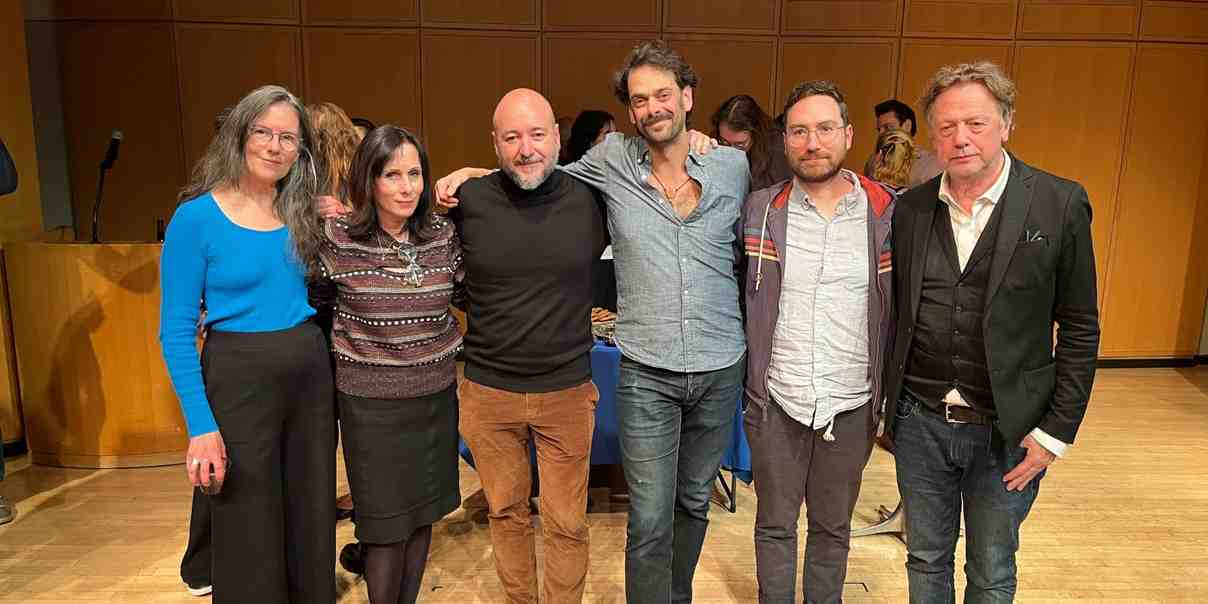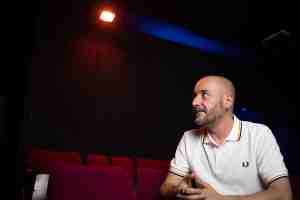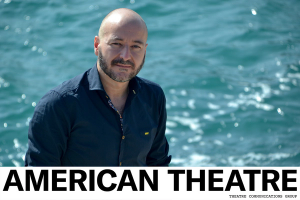
Expiation: Reflections on THE NICEST BODY EVER SEEN AROUND THESE PARTS
Meet the Participants

JAY STULL (director, dramaturg, and playwright). His work has been developed or produced by Ars Nova, The Alliance Theater, Bloomington Playwrights Project, NY City Center Off Center, NYTW, Joe’s Pub, The Gym at Judson, PlayCo, Roundabout, and The Tank. He is an alumnus of the Clubbed Thumb Directing Fellowship, Lincoln Center Directors Lab, and The Civilians R&D Group, and is a recipient of a Yaddo Fellowship, and a NYSCA/NYFA Artist Grant for Playwriting. He has taught theater at Harvard College, NYU-Tisch, and the American Academy of Dramatic Art. His play The Singularity Play will premier at Jackalope in Chicago in May of this year. MFA: Columbia. www.jaystull.com
.some very sad days
Within the first weeks of shutdown in March of 2020, the playwright Josep Maria Miró lost two dear friends. By May of that same year, he had written The Nicest Body Ever Seen Around These Parts in a fugue of grief. I came to know this play in September of last year and met Josep Maria in November when, in collaboration with the actor David Skeist and PlayCo, we presented a reading of the play at The Segal Center. Our collaboration buoyed us in what was otherwise a season of mourning, and I began to think about what it means to create, in Josep Maria’s words, “during some very sad days.”
.expiation
Expiation is a word that comes up in our conversation immediately. The Nicest Body is inspired, in part, by the Pasolini film Teorema, particularly the way sex is used to destabilize a bourgeois family, driving some to madness. Josep Maria’s play, a single actor channeling seven distinct characters in monologue casts the bourgeois world as violently repressive, denialist, hypocritical, and corrupt. We are talking over coffee in a cafe in brownstone Brooklyn: a bourgeois idyll. I am thinking about the violence that creates the conditions of our encounter and sustains it. Josep Maria is talking about Albert, and Albert is a seventeen year old teenager in a provincial town in Catalonia who has the nicest body ever seen around those parts and fucks his way through half of it. He is killed at the top of the play, his body mutilated and left to rot in a field, discovered by -- is killed…Sorry. I mean, of course, someone killed him, but we never, in the play, learn who. Perhaps violence has its own legs, its own, unaccountable path through the world.
A door to the cafe opens and I am grateful for a cold wave of air. Josep Maria is in the restroom. The leaves outside are yellow in the sun, and someone is up, suddenly, lurching after a toddler. The barista knocks a filter clean, steams a frothing pitcher of milk. Our conversation calls to mind an essay by Wally Shawn that I had read years ago. He writes about neighborhoods and empires, and I find myself hungry for the exact quote. (Later, I will find it in his collection of essays: “It turned out that simply in order to be secure and protect our neighborhood, we needed an empire.”)
Our scripts are out and we are talking about a 15th-Century Fra Angelico painting in the Prado, The Annunciation. I look the image up on my phone. In it, The Virgin genuflects in a shaft of light through a window as she receives news of the Incarnation from an angel. This is how Albert comes to Julia in the play, Josep Maria tells me - through a window, like a beam of light.
Julia is Albert’s school principal. She is forty-three, married, has a daughter, and is fucking Albert in classrooms after school, in her car, in the woods, and, once, in a cemetery. In the wake of his murder, Julia contemplates what it would take to make a different world than the one that mutilates and kills the beautiful and the young. We talk about The Virgin’s gesture in the painting. Her hands, folded across her sternum, a gesture befitting the world-altering knowledge the angel comes to give her. We share this with David later that week in rehearsal. We each practice the gesture.
Josep Maria charms me. It is partly that neither of us speaks the language of the other well enough to have a fluent conversation, and it is partly that we are both irrepressibly verbal. Words build up. I speak slowly and listen even slower. Expiation. Not atonement, and not penance. I turn the word over like a rosary.
Is something embedded within Julia, some Second Coming? Or is it more that a rotten weed is uprooted? A friend of mine struggled to conceive for years. There are many theories about what may have ultimately happened, but one night over the kitchen table after her son was born she told me a story about her aunt in Chile, who, while she was visiting her family there, performed a prayer over her womb, an unofficial exorcism. My friend - ever the skeptic, especially of Catholics - reported feeling something uproot within her. A month later, she was with child.
I think about sex within empire and the shape that Julia’s and Albert’s desires give to a possible alternative world. I think about Josep Maria’s grief, about his hometown and my own, about the wealth and power that inheres in a cafe in Brooklyn, about the Shawn essay, and Gaza.
I think about Adrienne Rich’s Love Poem IV, about how the poet returns to her apartment from a night spent with her lover, the poem free with enjambed afterglow, Nina Simone, and then the tortured body in the mail: You know I think men love wars. / My incurable anger, my unmendable wounds / break open further with tears, I am crying helplessly, / and they still control the world, and you are not in my arms.
I am late for my next meeting.
Josep Maria is headed to the MoMA.
I show him a subway map on my phone.
We make plans for later.
.translation
Josep Maria, David, and I are rehearsing Antonia, Albert’s mother, who, distraught after the death - murder, I mean; murder - of her son, makes her way to the house of the mayor of this provincial town. Antonia had dated him in high school and she is, amidst all her obvious grief, also partly grieving her bad fortune. She looks around the mayor’s house, envisions his wife upstairs, still asleep, and feels an ownership over a life she doesn’t lead and didn’t choose. Antonia still carries the slights from high school along with her like a bag of broken glass. She remembers seeking, in vain, a boy who was her equal in intelligence and sensitivity. None of them were, of course, and so her search was long, leading all the stupid, rejected boys to taunt her and call her a sow. Or so says the translation. David and I wander around this word a bit. It doesn’t feel particularly American or clear, but Sharon Feldman’s translation is otherwise so unerring that we trust it for the time being.
We’re in this part of the text now, and Josep Maria is asking us about the history between the mayor and Antonia, what we know and can infer from the text, why the boys in school had called her a sow. We don’t know, we say. We reveal ourselves as helpless, here, with regard to that word, "sow". We infer that it's negative, that it likens Antonia to a pig, but doesn’t carry vernacular truth.
It comes out that Antonia is being maligned as a slut, or tramp, or hussy, or any of the other words that patriarchy and the promise of bourgeois stability use to regulate bodies and desire. And it is this cursed word - slut - that likely also applied to Albert, may have been among the reasons someone killed him, the word itself hobbled by its own possibility, a world of ranging desire, of unregulated sex that Albert’s life both invokes and invites.
That word has a valence, here, whereas "sow", we explain, doesn’t quite carry the meaning. When I speak to Sharon it also becomes clear that the inquiries of such words don’t arise in translation in the way they do in rehearsal. Conceivably, "sow" could work in the piece. But the truth of the text finds its clearest articulation through the investigation of the actor and we are all very grateful for those questions and surprised by what is hidden in plain sight by language.
.performance
We’ve turned on the theatrical lighting in The Segal Center to watch David play Josep Maria’s text, and he does it so well, and the room is warm because of the lights, and the play spins tightly down. David’s performance leaves a clear image of the town, which is surprisingly close at hand, culturally: as likely to be in Virginia or Kansas as Catalonia. Josep Maria calls the play a gift, or a declaration of love for actors. I see it as a call to the higher reaches of craft; performing the play requires revealing the permeability of identity, its costume-like features, showing the multitude a person can - or does - contain. David is those seven people in the script, certainly, but also himself; and he is also the reflection of all those whom he encounters in the world, in the play, and also here in the theater, all of us in the audience seeing in each of his characterizations people we know and carry, echoing a limitless, exponential network of identity.
Everyone applauds and someone brings out a table and sets up some wine and a platter of cookies in this warm, bright room. Josep Maria and Sharon take pictures and we’ve gone over time and are being encouraged to disperse. We don’t seem to pay it much mind until someone shuts off the lights, abruptly, and then we’re out in the lobby and the street and then a nearby Korean barbeque restaurant, a group of us, unwilling to break apart for the time being, holding, as we are, that imagined world in the theater that gestured toward ways out of the real, the everyday, the corrupt. How easy it is in the theater to be different than what we are.
The play’s implicit Catholicism rubs off on me. I begin to pray for the loosening of identity, for the sunbeam through the window, for desire as sunbeam, for sex in the world, for world-altering knowledge and world-altering sex, for a gesture of gratitude, a genuflection at the sternum, for uprooting, for embedding, and for the hope that out of grief, out of all this ceaseless grieving, can come possibility. A different world. A play, among other things.
Written by
Jay Stull

